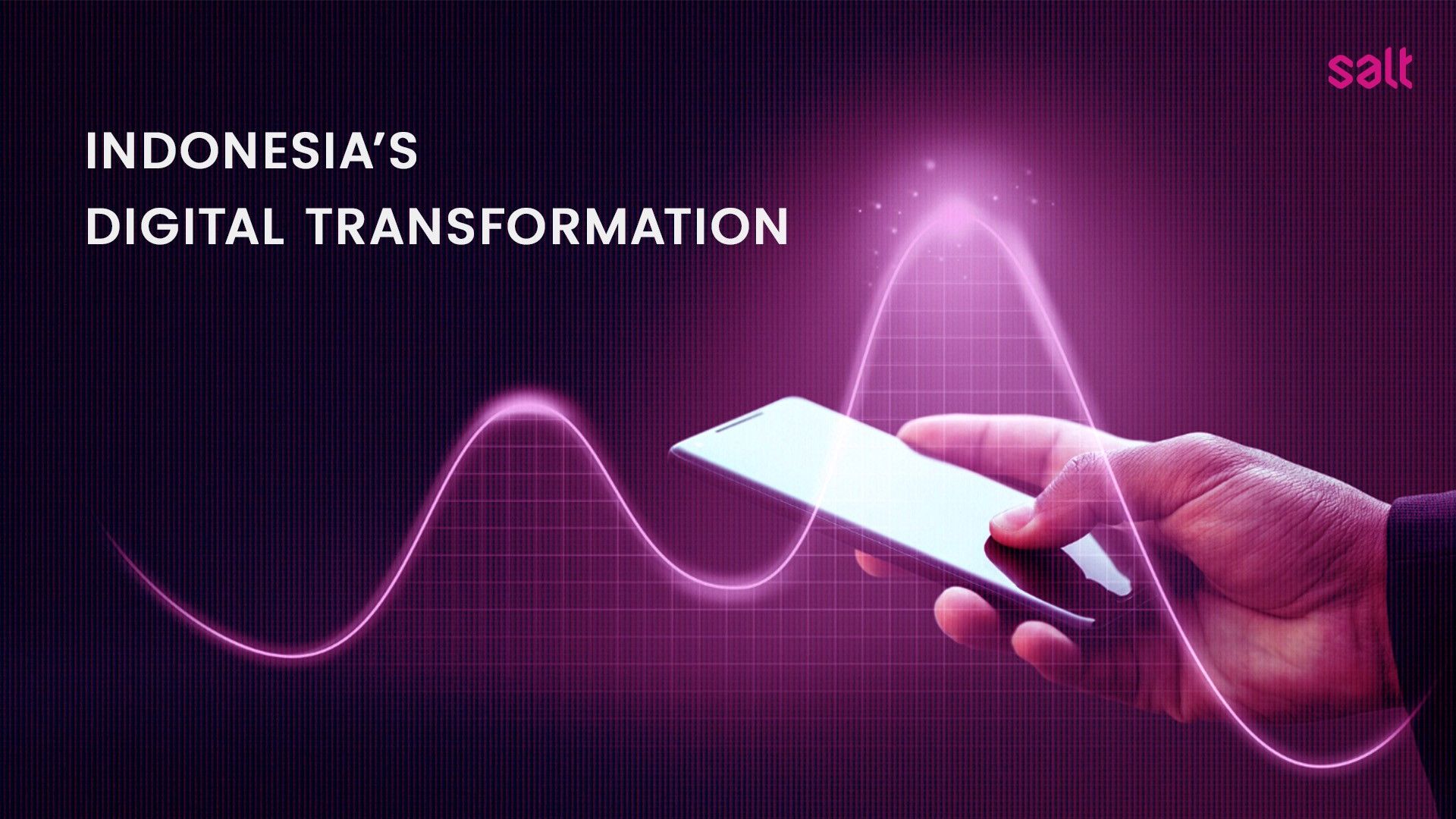The globalization era has brought rapid technological progress and made digital transformation necessary for every single country, including Indonesia.
Digital transformation is not just about the application of technology but also how this technology can change the way we live, work, and interact.
Here is an in-depth review of digital transformation in Indonesia and the crucial role of SALT in this process.
What is Digital Transformation?
"Digital Transformation" refers to using digital technology to create or modify services and business processes to be more efficient, effective, and innovative.
It involves integrating digital technology into all aspects of business, resulting in fundamental changes in how businesses operate and deliver value to customers.
Beyond just the implementation of technology, digital transformation also includes changes to company culture, where organizations continuously experiment internally and externally.
Key aspects of digital transformation include:
- Digitization of Information
Converting information from analog to digital enables new data analysis methods.
- Process Automation
Replacing manual tasks with automation solutions to improve efficiency and reduce costs.
- Digital Customer Experience
Creating seamless interactions with a personalized approach to customers through digital channels.
- New Business Models
Using technology to modify or create new business models that add value.
- Innovative Culture
Building an organizational culture that embraces risk with innovation and quickly adapts to changes.
Focusing on these aspects, digital transformation changes how organizations use technology and how they operate, compete, and serve their customers.
This transformation requires commitment from all levels of the organization, a deep understanding of the latest technologies, and their potential to change the industry landscape.
The Importance of Digital Transformation in Indonesia
Indonesia, as one of the largest economies in Southeast Asia, is facing the urgency of digital transformation to support sustainable growth.
This is driven by the need to improve operational efficiency, strengthen global competitiveness, and quickly respond to dynamic societal needs.
Digital transformation is also a key to achieving "Vision Indonesia 2045," which aims to become one of the strongest economies in the world by maximizing the digital economy's potential.
Indonesia's Digital Economy Growth Potential
Indonesia's digital economy has shown significant growth, with the digital industry's value increasing from 41 billion dollars in 2019 to 77 billion dollars in 2022.
It is expected to rise to 130 billion dollars by 2025, driven by sectors such as e-commerce, online transportation, online media, and various other digital services.
Given their critical role in the national economy, the government also aims to expand SMEs' participation in the digital economy.
Indonesian Government Policies
The government has committed and taken strategic steps to accelerate digital transformation in Indonesia. Examples of initiatives include:
- Digital Infrastructure Provision
Strengthening digital infrastructure, including internet networks and national data centers (PDN), to support digital economy growth and ensure fast and secure digital services for the public.
- Digital Education Programs
Launching various programs to improve public digital literacy, including the Digital Talent Scholarship (DTS) and Digital Leadership Academy (DLA), to prepare competent human resources in digital technology.
- Support for SMEs
The National Proud of Indonesian Products Movement (Gernas BBI) aims to increase the number of SMEs involved in the digital ecosystem, hoping to boost their contribution to the national economy.
Digital Transformation Framework
Digital transformation is a comprehensive journey that changes how organizations operate and interact with customers.
The main elements of this journey are summarized in a digital transformation framework that includes customer experience, operational agility, culture and leadership, workforce enablement, and digital technology integration.
- Customer Experience
At the heart of digital transformation, it relates to how an organization designs and delivers satisfying and memorable customer interactions across all digital touchpoints.
- Operational Agility
An organization's ability to adapt to change and make quick decisions based on data and insights obtained through digital technology.
- Culture and Leadership
Visionary leadership is required to drive change, build an innovation culture, and ensure the entire organization moves in the same direction.
- Workforce Enablement
Involves using digital technology to enhance employee skills and productivity, including digital skill training and collaboration tools.
- Digital Technology Integration
Lastly, digital technology integration is the foundation for other elements in digital transformation.
This involves adopting new technologies such as Cloud Computing, Big Data, Artificial Intelligence (AI), and the Internet of Things (IoT) to overhaul business processes, operational models, and customer experiences.
Digital technology integration enables organizations to create new services and products, enhance efficiency, and gain a competitive edge.
These five elements of the digital transformation framework guide organizations in navigating their digital journey.
By focusing on these key elements, organizations can be better prepared to face challenges and seize opportunities in the continuously evolving digital economy.
SALT’s Role in Indonesia's Digital Transformation
Technology innovation companies like SALT play a significant role in driving and facilitating digital transformation in Indonesia.
SALT's contributions include developing the latest technologies ready for adoption by businesses in Indonesia, such as:
- Website, Mobile App, and Various Digital Platform Development
- Implementation of AI, E-commerce, Cloud, Blockchain, and Cyber Security Technologies
- Application of Technology Operation (TechOps) and Development Operations (DevOps)
- IT Talent Augmentation (Outsourcing, Headhunting, Talent Pool)
- Development of Data and Other Digital Platforms
Besides the services offered, SALT also accelerates business growth for partners/clients with several approaches:
- Adoption of New Technologies
Enabling businesses to adopt the latest technologies aligned with digital trends.
- Operational Efficiency Improvement
Through automation and digital solutions, SALT helps businesses increase operational efficiency, reduce costs, and improve productivity.
- Enhanced Customer Experience
With user-friendly mobile and web applications and effective digital platforms, SALT helps businesses improve customer experience, driving loyalty and retention.
- Security and Compliance
In the digital era, data security is a top priority. SALT offers cybersecurity solutions that ensure customer and business data remains secure, complying with applicable regulations.
- Innovation and Market Leadership
By integrating innovative solutions, SALT helps businesses survive the competition and become market leaders through differentiation and innovation.
Providing various leading technology solutions, SALT not only supports businesses in their digital journey but also helps accelerate the growth of Indonesia's digital economy.
Questions regarding Digital Transformation in Indonesia
a. Why Should Companies Have a Digital Transformation Strategy?
Digital transformation is no longer an option but a necessity for companies to remain relevant in an increasingly competitive market.
A digital transformation strategy enables companies to leverage the latest technology to enhance operational efficiency, expand market reach, and improve customer experience.
With a mature digital transformation strategy, companies can quickly and accurately identify new opportunities and respond to market changes.
b. What Factors Can Influence the Success of a Company's Digital Transformation?
The success of a company's digital transformation depends on several key factors, including:
- Strong Organizational Leadership
- An Adaptive Organizational Culture
- Technology Integration
- Data and Analytics
- Strategic Business Cooperation
Key Takeaways
The digital transformation process in Indonesia is a continuous journey towards a brighter future.
Every aspect, from building robust digital infrastructure and developing a sustainable digital economy to improving digital literacy among the public, is vital in ensuring Indonesia can progress further.
On one hand, SALT, as a company experienced in technology innovation, is at the forefront of this revolution, especially in the digital business ecosystem in Indonesia.
With technology solutions on various fronts, SALT assists businesses in adapting and growing in the digital environment and supports Indonesia's vision to become a robust digital economy power someday.
Let's connect with SALT to begin your business transformation journey towards digital technology excellence!





